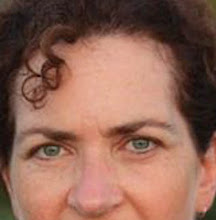Our Bluebird boxes haven't yet held Bluebirds.
Last year, we hosted a family of Tree Swallows and House Wrens--this year, it's Tree Swallows and Chickadees. But, nevertheless, the anticipated visitors each spring and the activity they add to our hilltop trail, brings us a little closer to the bird world--by bringing them a little closer to us.
This morning as I walked past, I heard a commotion from inside the chickadee residence. The front panel is held fast with a screw, so, before I went back to investigate, I grabbed the screwdriver from the mudroom shelf. By the time I returned to the box, a bloodied baby lay in the grass beneath it, still warm, but dead. Inside, two more recent kills--their small feathered bodies perfectly still on their mossy bed.
By the time I returned to the box, a bloodied baby lay in the grass beneath it, still warm, but dead. Inside, two more recent kills--their small feathered bodies perfectly still on their mossy bed.
Too late to stop the massacre.
Too nearsighted to see who had flown from within. As I stood helplessly by, resigned to the fact that I, too, as so many other box-watchers find, now have something to protect against--from the side, buried deep in the tall grass, a tentative, "dee dee dee."
As I stood helplessly by, resigned to the fact that I, too, as so many other box-watchers find, now have something to protect against--from the side, buried deep in the tall grass, a tentative, "dee dee dee." Barely visible, buried deeply beneath--a survivor.
Barely visible, buried deeply beneath--a survivor. Tangled within the tall grass, his small blue foot holding tightly.
Tangled within the tall grass, his small blue foot holding tightly.
He had escaped.
Putting him back into the box was not an option--for whoever attacked there before would likely repeat--intent upon claiming the box as their own. But the parents seemed unable to tend to him as he was. The field has already grown tall and thick.
After a series of phone calls and answering machines, I decided to try Kathi, at work, for advice--she's tended boxes for years, and knows the bird world well.
She suggested providing a brush pile--to both shelter him and allow him to climb above the grass.
In a few minutes, I had one ready.
But neither heard nor saw the little chickadee anywhere.
I walked on, past Little Pond pool, to the other box, where the swallows are almost ready to fledge.
All was peaceful and as it should be.
I turned back toward the chickadee box.
And there, calling from the top of the newly placed pile--
was the little survivor.

Update :
By evening, 3 nestlings were emerging from the grass beneath the nest box.
See them here.



































































17 comments:
Don't have to see to know the culprit...Bless you for trying to care for the little one left.
Oh, Nina, the pictures are even worse than the phone call. :( I'm so sorry you had to go through that, and so glad that at least one little guy survived. I'm happy my advice worked for you both.
Once cavity nesters have been forced into premature fledging, either accidently by overzealous nest monitors or in desparation, when fleeing for their lives, you can't get them to stay in the nest box. In this case, of course, returning him to the box would be the end of him, but he should be fine now. The brush pile will provide him with cover, and yet allows him to get up high enough so his folks can find him and feed him till he's ready to try his own wings.
You did a Good Thing today, and Mother Nature is smiling on you!
Hoorah for (native) cavity nesting birds! (and the people who care for them)
~Kathi
What an amazing story! Brutality, kindness and hope all at the same time. What could the killer have been? House sparrows? If that were my box, I know I'd be checking to see who moves in next with a little pay-back in mind. Did you hear Julie Z's NPR commentary last year about house sparrows in her bluebird boxes and the static she got for 'playing God'?
Kathi--I was so glad to catch you on your "lunch"--just needed someone to tell me they'd be ok and how to do right, yet not interfere.
I have great news, too.
This evening I find there are actually THREE babies in the grass. All squawking for their mom, and hopping to perches.
Wait till you see their fuzzy little faces!
Thanks for being there!
Mojo:
I'm certain it was a House Sparrow. Around here (and I'm not too far fom Nina) the HOSP are starting on their second clutch of the season, so are out looking for nesting sites. The type of injury (pecks to the head) are typical of HOSP. Stalings can't get into a properly designed bluebird box. House Wrens will pierce eggs and toss them out of a nest box they want, but I don't think they would go after baby birds. I have seen Tree Swallows chasing off other birds who want the same box, but have never heard of them attacking young. Besides, Tree Swallows only have one brood per season, and they are all on the nest now.
Raccoons drag nesting material out of the box along with whatever eggs or young they are preying on. Snakes eat the babies and go, leaving only an empty box.
Nina:
That's great! Three survivors!! I couldn't be happier. And, Little Guy No. 1 will be much happier, too, having his brother and sister around for company and to snuggle up together with tonight, to share body warmth.
Whoo-hoo!!!
~Kathi
How wonderful that you were able to help these little guys. We'll be looking forward to more pictures.
A sad story with a happy ending. They are lucky you found them Nina. I wish them good luck now.
Coming in late...my blood boils. I hope you have an in-box trap to set in the box for that bloody house sparrow. www.nabluebirdsociety.org has a catalogue of traps. I use the Gilbertson. And when I've got the bird, I just put a tall kitchen garbage bag over the whole house, open it through the bag and nab the sparrow in the bottom of the plastic bag when it flies out. I'm sure Kathi can guide you through. Thank goodness for help that helps.
The first thing I thought when you found the survivor was that chickadees usually have bigger broods than four, and I hoped there were more in the grass. Delighted to hear there were others. Smart little things, to bail while the murderer was busy--just like a chickadee. And chickadee parents are the best parents out there. If any bird could raise prematurely fledged young, it's chickadees. Let's pray for continued sunshine for the babies and successful capture of those @#$@#$#$% sparrows!
Oh my goodness, so wonderful you were there to help out. The little ones are so cute. Glad the parents can find them now. How upsetting. Glad all is working out okay.
I watched my chickadees feed their little ones today. Always a pleasure to see the birds be successful.
Sherry
A cyber award is yours for having a wonderful web site that brings me lots of joy and insight when I visit! Please go to my site (Sierra Nevada Ramblings) to read about the award and pick it up.
I wish I had been here to get your call, Nina. What kind of rescuer am I? Jeez.
But Kathi gave you sound advice and the wee little peep now has a chance.
Blogging rocks, doesn't it?
: )
I'll definitely have to pay more attention to what is happening along the trail where we've put these boxes.
I guess that if you decide to play host (or hostess) you also agree to manage them responsibly.
And, although the question of "playing God" pops up, it seems almost the same as laying a mouse trap in your (human) house.
I wouldn't dream of exterminating them in their natural environment, but as soon as they cross that line, they're mine!
We'll keep eyes and ears open--and be responsible box keepers.
Nina:
I was a bluebirder for over a decade before I experienced my first HOSP attack. I was anti-killing, and prided myself on my "passive" methods of non-lethal control. Didn't want a stain on my karma. Then, a male HOSP broke 3 eggs of a bluebird couple's second nest attempt and two more eggs when they tried again.
The bluebirds left and the HOSP didn't even use the nest box for his own clutch, just sat on it cheep-cheeping all day. That's when I changed my tune.
Yes, the moral issues are tough, and the phrase "playing God" rings in my ears a lot. I am resigned to this odious task, despite the hassle I get from those who don't understand, including my staff.
This year, I have witnessed a starling pinning down a Purple Martin and repeatedly pecking at it as it tried to exit an apartment in my aluminum house. Also, a house sparrow couple destroyed 4 martin eggs and tried to nest in their spot, despite there being a half dozen other sites available in the immediate area. Those are just the two incidents I know of. Who knows what happens when I am gone all day?
Even though I still hate it, I have been completely converted. I will do what I must to protect the birds I have encouraged to live beside me. As an added bonus, I donate the bodies to RAPTOR, Inc. to feed their Cooper's Hawks and Lucy the Peregrine Falcon.
I sympathize with your loss and with the conflict you must be feeling. Let me know if you need any advice or support.
~Kathi
I think most reading these discussions understand the history of House Sparrows and the frustration, to put it mildly, that workers in nesting box programs designed to aid cavity-nesting birds feel in encountering them. But, for those who may ponder the strategies and struggle with, "who gets to make this choice?"--and, "for what reason?", I find it helpful to remember these facts:
House Sparrows are a non-native species, and were accidentally introduced to this country in 1850, from Europe. (Cornell Lab of Ornithology)
They compete with our native species for nest sites.
Bluebirds (one of our North American native cavity-nesters), especially, face many nesting challenges and populations are in decline. (North American Bluebird Society)
A "recovery program" for native species involves providing nest
sites and removing non-native, (introduced by man) species.
It's an attempt to restore the balance God intended.
The above commentary by Katdoc and Nina offer sufficient justification for drastic action against HOSP.
To restore ecological balance , it is necessary to take determined action against exotic,invasive species ,like HOSP.zebra mussels and many others,that behave as weed species capable of out- competing native ones.
Just as farmers must combat weeds to insure a bountiful crop,so too must the animal weed species be dealt with when they threaten the survival of native species. It IS the right thing to do.
Julie--Thanks for the link and advice about traps. There's no activity around the house today, though. I'll see what tomorrow brings.
Nina, oh the drama of nature, the trials, tragedy and triumphs! I'm so glad some survived. I love the cute little chickadees! On behalf of the birds, Thank You for making the brush pile! What a great tip!
Post a Comment